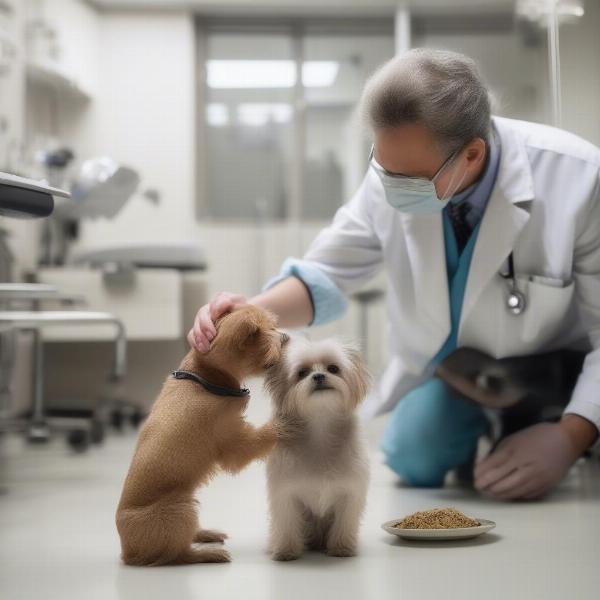Small dog food isn’t just about smaller kibble; it’s about providing concentrated nutrition tailored to the unique needs of your pint-sized pal. From energetic Chihuahuas to cuddly Pugs, small breeds have faster metabolisms and higher energy requirements than their larger counterparts. Choosing the right small dog food is crucial for their overall health, longevity, and happiness. This comprehensive guide will explore everything you need to know to make informed decisions about your small dog’s diet, ensuring they receive the optimal nutrition they deserve.
Understanding the Nutritional Needs of Small Dogs
Small dogs burn energy quickly, meaning they need more calories per pound of body weight compared to larger breeds. Their smaller stomachs also mean they need to eat more frequently, often requiring several small meals throughout the day. A balanced small dog food formula should be rich in high-quality protein for muscle development and maintenance, healthy fats for energy and skin health, and complex carbohydrates for sustained energy release. Essential vitamins and minerals are also vital for supporting their immune system, bone health, and overall well-being.
Choosing the Right Small Dog Food
The pet food aisle can be overwhelming with countless options. Look for small dog food specifically formulated for small breeds, indicated on the packaging. Consider your dog’s age, activity level, and any specific health needs. Puppies, adults, and seniors all have different nutritional requirements. An active dog will need more calories than a less active one. If your dog has allergies or sensitivities, opt for hypoallergenic or limited ingredient diets. Always check the ingredient list, prioritizing high-quality protein sources and avoiding artificial colors, flavors, and preservatives.
Dry vs. Wet Small Dog Food
Both dry and wet food have their advantages and disadvantages. Dry kibble is convenient, affordable, and helps maintain dental health. Wet food is often more palatable, especially for picky eaters, and has a higher moisture content, which can be beneficial for dogs prone to urinary tract issues. You can also combine both for a balanced approach.
What About Homemade and Raw Diets for Small Dogs?
Homemade and raw diets are gaining popularity, but they require careful planning and balancing to ensure your dog receives all the necessary nutrients. Consult with a veterinary nutritionist to create a safe and complete homemade or raw diet specifically designed for your small dog’s needs.
 Veterinarian Examining Small Dog
Veterinarian Examining Small Dog
Addressing Common Small Dog Feeding Issues
Small dogs can be notoriously picky eaters. Try different flavors and textures to find what your dog prefers. Avoid free-feeding and stick to a regular feeding schedule to establish healthy eating habits. Dental health is also crucial for small breeds; choose kibble designed for dental care or supplement with dental chews.
Conclusion
Choosing the right small dog food is a vital part of responsible pet ownership. By understanding their specific nutritional needs and considering factors like age, activity level, and health conditions, you can provide your small dog with the optimal diet to thrive. Remember to consult with your veterinarian for personalized advice and recommendations.
FAQ
- How much should I feed my small dog? Consult the feeding guidelines on the dog food packaging and adjust based on your dog’s individual needs and activity level.
- What are some signs of food allergies in small dogs? Itchy skin, ear infections, digestive upset, and excessive licking can be signs of food allergies.
- Can I give my small dog human food? Some human foods are safe for dogs in moderation, but many are toxic. Consult your veterinarian before giving your dog any human food.
- How often should I change my small dog’s food? Avoid sudden changes in diet. If you need to switch foods, do it gradually over several days.
- Why is my small dog not eating? Loss of appetite can be a sign of underlying health issues. Consult your veterinarian if your dog is consistently refusing food.
- What is the best type of food for senior small dogs? Senior dog food formulas are designed to address the specific needs of aging dogs, such as joint health and cognitive function.
- Are grain-free diets good for small dogs? There is no one-size-fits-all answer. Discuss the pros and cons of grain-free diets with your veterinarian.
ILM Dog is your trusted partner in dog care, providing reliable, practical advice on everything from breed selection and health care to training, nutrition, grooming, and more. Whether you’re a seasoned dog owner or just starting your journey, our expert content is designed to empower you with the knowledge you need to care for your canine companion. For personalized guidance on dog nutrition, contact us at [email protected] or call +44 20-3965-8624. ILM Dog is dedicated to helping you and your dog live a happy, healthy life together.